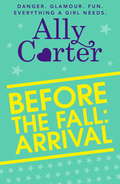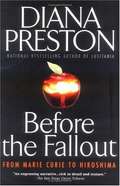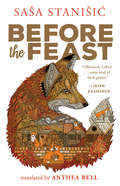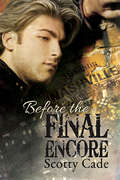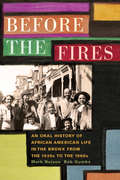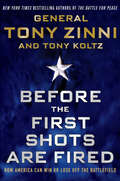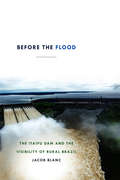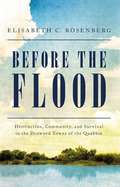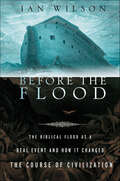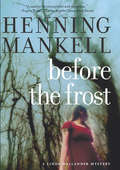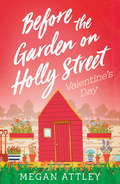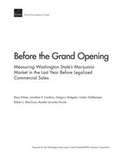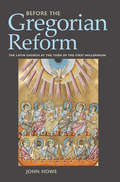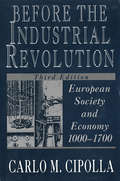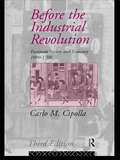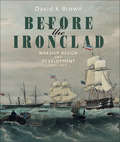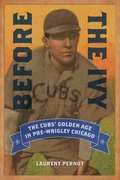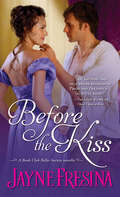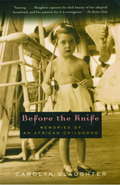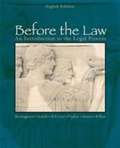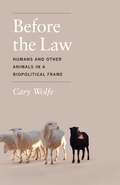- Table View
- List View
Before the Fall: Arrival (Embassy Row #1)
by Ally CarterDon't miss this free, bonus short story from New York Times bestselling author Ally Carter's brand-new series, Embassy Row.Product Description:Grace Blakely is absolutely certain of three things:1. She is not crazy.2. Her mother was murdered.3. Someday she is going to find the killer and make him pay.As certain as Grace is about these facts, nobody else believes her - so there's no one she can completely trust. Not her grandfather, a powerful ambassador. Not her new friends, who all live on Embassy Row. Not Alexei, the Russian boy next door, who is keeping his eye on Grace for reasons she neither likes nor understands.Everybody wants Grace to put on a pretty dress and a pretty smile, blocking out all her unpretty thoughts. But they can't control Grace - no more than Grace can control what she knows or what she needs to do. Her past has come back to hunt her . . . and if she doesn't stop it, Grace isn't the only one who will get hurt. Because on Embassy Row, the countries of the world stand like dominoes, and one wrong move can make them all fall down.Praise for Ally Carter:Ally Carter is an author that you simply can't miss. - Gripped into BooksGallagher Girls books have real heart, pushing strength and sisterhood over sass, with super wit and humour too... brilliant. ***** Books for KeepsAbsolutely unputdownable and completely gripping... everything that fans of this series will have been waiting for... 10/10... an incredible series in which each book gets better and better. The GuardianAlly Carter has done it again! From the story to the cover, everything about All Fall Down is exciting and sure to keep you on your toes! http://sassyanddangerous.blogspot.mx/About the Author:Ally Carter writes books about spies, thieves, and teenagers. She is the New York Times best-selling author of the hugely popular Gallagher Girls series, including I'd Tell You I Love You but Then I'd Have to Kill You, Cross My Heart and Hope to Spy, Don't Judge a Girl by Her Cover, and Only the Good Spy Young.She lives in the Midwest where her life is either very ordinary or the best deep-cover legend ever. She'd tell you more, but...well...you know.
Before the Fallout: From Marie Curie to Hiroshima
by Diana PrestonPreston describes the development of nuclear weapons, beginning with Marie Curie's work with radioactivity at the turn of the twentieth century and discussing the advances of subsequent scientists like Rutherford, Bohr, Einstein, and Oppenheimer. She traces how scientific discoveries were transformed into the atomic weapon first used on Hiroshima. Preston is the author of other books, including Lusitania: An Epic Tragedy.
Before the Feast
by Anthea Bell Sasa StanisicIt's the night before the feast in the village of Fu¨rstenfelde (population: an odd number). The village is asleep. Except for the ferryman--he's dead. And Mrs. Kranz, the night-blind painter, who wants to depict her village for the first time at night. A bell-ringer and his apprentice want to ring the bells--the only problem is that the bells have gone. A vixen is looking for eggs for her young, and Mr. Schramm is discovering more reasons to quit life than to quit smoking. Someone has opened the doors to the Village Archive, but what drives the sleepless out of their houses is not that which was stolen, but that which has escaped. Old stories, myths, and fairy tales are wandering about the streets with the people. They come together in a novel about a long night, a mosaic of village life, in which the long-established and newcomers, the dead and the living, craftsmen, pensioners, and noble robbers in football shirts bump into each other. They all want to bring something to a close, in this night before the feast.
Before the Final Encore (Encore)
by Scotty CadePrequel to Final EncoreTires flying over the interstate, college student Ian Dillon can't get out of Greenville, SC quickly enough. As he watches his entire life fading away in his rearview mirror, his thoughts are only of his lover, Todd, and the memories of their time together, now completely shattered by Todd's incomprehensible betrayal. His mind still reeling, Ian drives through the night until a split second decision guides him to Nashville, Tennessee. Everything will be better there. It has to be!
Before the Fires: An Oral History of African American Life in the Bronx from the 1930s to the 1960s
by Mark D. Naison Bob GumbsPeople associate the South Bronx with gangs, violence, drugs, crime, burned-out buildings, and poverty. This is the message that has been driven into their heads over the years by the media. As Howard Cosell famously said during the 1977 World’s Series at Yankee Stadium, “There it is, ladies and gentlemen, the Bronx is burning.” In this new book, Naison and Gumbs provide a completely different picture of the South Bronx through interviews with residents who lived here from the 1930s to the 1960s.In the early 1930s, word began to spread among economically secure black families in Harlem that there were spacious apartments for rent in the Morrisania section of the Bronx. Landlords in that community, desperate to fill their rent rolls and avoid foreclosure, began putting up signs in their windows and in advertisements in New York’s black newspapers that said, “We rent to select colored families,” by which they meant families with a securely employed wage earner and light complexions. Black families who fit these criteria began renting apartments by the score. Thus began a period of about twenty years during which the Bronx served as a borough of hope and unlimited possibilities for upwardly mobile black families.Chronicling a time when African Americans were suspended between the best and worst possibilities of New York City, Before the Fires tells the personal stories of seventeen men and women who lived in the South Bronx before the social and economic decline of the area that began in the late 1960s. Located on a hill hovering over one of the borough’s largest industrial districts, Morrisania offered black migrants from Harlem, the South, and the Caribbean an opportunity to raise children in a neighborhood that had better schools, strong churches, better shopping, less crime, and clean air. This culturally rich neighborhood also boasted some of the most vibrant music venues in all of New York City, giving rise to such music titans as Lou Donaldson, Valerie Capers, Herbie Hancock, Eddie Palmieri, Donald Byrd, Elmo Hope, Henry “Red” Allen, Bobby Sanabria, Valerie Simpson, Maxine Sullivan, the Chantels, the Chords, and Jimmy Owens.Alternately analytical and poetic, but all rich in detail, these inspiring interviews describe growing up and living in vibrant black and multiracial Bronx communities whose contours have rarely graced the pages of histories of the Bronx or black New York City. Capturing the excitement of growing up in this stimulating and culturally diverse environment, Before the Fires is filled with the optimism of the period and the heartache of what was shattered in the urban crisis and the burning of the Bronx.
Before the First Shots Are Fired: How America Can Win or Lose Off the Battlefield
by Tony Zinni Tony KoltzFor the better part of the last half century, the United States has been the World's Police, claiming to defend ideologies, allies, and our national security through brute force. But is military action always the most appropriate response? Drawing on his vast experience, from combat in Vietnam to peacekeeping in Somalia, to war games in Washington, DC and negotiations with former rebels in the Philippines, retired four-star General Tony Zinni argues that we have a lot of work to do to make the process of going to war—or not—more clear-eyed and ultimately successful. He examines the relationship between the executive and the military (including the difference between passive and engaged presidents); the failures of the Joint Chief of Staff; the challenges of working with the UN, coalition forces, and NATO; the difference between young, on the ground officers and less savvy senior leaders; the role of special forces and drone warfare; and the difficult choices that need to be made to create tomorrow's military. Among his provocative points:* Virtually every recent American military operation follows a disconnected series of actions that lead to outcomes we never foresaw or intended.* We need to assign accountability for the political decisions that can make or break a mission.* Words and ideas are as important to victory in today's conflicts as bullets.* The cyber "war" is ongoing. Either you must build better tech than the other guy, or you must steal it.* Our foreign aid budget is pitiful, our State Department, USAID, and the other government agencies that we critically need to be on a par with our military are underfunded, undermanned, and poorly structured for their current objectives.From the Oval Office to the battlefield, Before the First Shots Are Fired is a hard-hitting analysis of the history of America's use of military action and a spirited call for change.
Before the Flood: The Itaipu Dam and the Visibility of Rural Brazil
by Jacob BlancIn Before the Flood Jacob Blanc traces the protest movements of rural Brazilians living in the shadow of the Itaipu dam—the largest producer of hydroelectric power in the world. In the 1970s and 1980s, local communities facing displacement took a stand against the military officials overseeing the dam's construction, and in the context of an emerging national fight for democracy, they elevated their struggle for land into a referendum on the dictatorship itself. Unlike the broader campaign against military rule, however, the conflict at Itaipu was premised on issues that long predated the official start of dictatorship: access to land, the defense of rural and indigenous livelihoods, and political rights in the countryside. In their efforts against Itaipu and through conflicts among themselves, title-owning farmers, landless peasants, and the Avá-Guarani Indians articulated a rural-based vision for democracy. Through interviews and archival research—including declassified military documents and the first-ever access to the Itaipu Binational Corporation—Before the Flood challenges the primacy of urban-focused narratives and unearths the rural experiences of dictatorship and democracy in Brazil.
Before the Flood: Destruction, Community, and Survival in the Drowned Towns of the Quabbin
by Elisabeth C. RosenbergIn the tradition of Silent Spring, a modern parable of the American experience and our paradoxical relationship with the natural world. Though it seems a part of the "natural" landscape of New England today, the Swift River Valley reservoir, dam, dike, and nature area was a triumph of civil engineering. It combined forward-looking environmental stewardship and social policy, yet the &“little people&”—and the four towns in which they lived—got lost along the way. Elisabeth Rosenberg has crafted Before the Flood to be both a modern and a universal story in a time when managed retreat will one day be a reality. Meticulously researched, Before the Flood, is the first narrative book on the incredible history of the Swift River Valley and the origins Quabbin Reservoir. Rosenberg dive into the socioeconomic and psychological aspects of the Swift River Valley&’s destruction in order to supply drinking water for the growing populations of Boston and wider Massachusetts. It is as much a human story as the story of water and landscape, and Before the Flood movingly reveals both the stories and the science of the key players and the four flooded towns that were washed forever away.
Before the Flood: The Biblical Flood as a Real Event and How It Changed the Course of Civilization
by Ian WilsonIn the six hundredth year of Noah's life, in the second month, the seventeenth day of the month, the same day were all the fountains of the great deep broken up, and the windows of heaven were opened. And the rain was upon the earth forty days and forty nights.The great Biblical flood so described in Genesis has long been a subject of fascination and speculation. In the 19th century the English archbishop James Ussher established it as having happened in the year 2348 B.C., calculating what was then taken as the age of the earth and working backward through the entire series of Biblical "begats." Proof of the flood, which is an element of so many creation myths, began in earnest when archaeology started connecting physical evidence with Biblical story. The dream of proving the Bible as literal truth has proven irresistible, producing both spurious claims and serious scholarship.As best-selling historian Ian Wilson reveals in this fascinating new book, evidence of a catastrophic event has been building steadily, culminating in the work of William Ryan and Walter Pitman. Several years ago Ryan and Pitman had posited that around 5600 BC there had an inundation in the Black Sea of such proportions that it turned the freshwater lake into a saltwater lake by connecting it to the Mediterranean. Were that true, they estimated that there would be signs of civilization 300 feet below the surface of the Black Sea. In September 2000, using his famous underwater equipment, Robert Ballard (of SS Titanic fame) explored parts of the Black Sea near the Turkish shore and found the remains of wood houses. There had been a flood, and whether God's wrath or not it had destroyed everything around it for hundreds of miles, killing tens of thousands of people.Exploring all the archeological evidence, Wilson explains how the Black Sea flood and the Biblical flood have to be connected. In particular, Wilson argues, learnedly and persuasively, that the center of the civilized world was further to the West than previously thought-not in Egypt or Mesopotamia but in what is today Northern Turkey. The earliest, antediluvian civilizations may have migrated east into those places we have come to call the cradles of civilization, forced by the Black Sea flood to create new settlements.Scrupulous in its details and compelling in its sweep, Before the Flood is narrative detective history at its most provocative, contributing a vital new chapter to the debate about the Bible and origins of the modern world.
Before the Frost (The Linda Wallander Mysteries #1)
by Henning MankellInternational bestseller: Kurt Wallander and his daughter join forces to hunt for a ritual killer in this &“gripping, beautifully orchestrated&” mystery (The New York Times Book Review). Linda Wallander is bored. Having just graduated from the police academy, she&’s waiting to start work with the Ystad police and move into her own apartment. In the meantime, she&’s staying with her father and, like fathers and daughters everywhere, they are driving each other crazy. Nor will they be able to escape each other when she moves out. Her father is Inspector Kurt Wallander, a veteran of the Ystad police force, and the two of them are about to find themselves working a case that couldn&’t be closer to home. Linda&’s childhood friend Anna has disappeared. As the investigation proceeds, she makes a few rookie mistakes that are both understandable and life-threatening. But as the case her father is working on dovetails with her own, something far more dangerous, and chillingly calculated, begins to emerge. A &“powerful&” and &“thoroughly engaging&” thriller from &“a master storyteller,&” Before the Frost introduces an unforgettable new heroine to the acclaimed series that is the basis for the BBC television show starring Kenneth Branagh (San Francisco Chronicle).
Before the Garden on Holly Street: Valentine's Day
by Megan AttleyGet a taste of the coming series about how 'family' can come from the most unlikely of places from debut talent, Megan Attley. It's Valentine's Day and Abby is ready to celebrate with her long-term partner, Gavin - the music is on, the wine is breathing and Abby is wearing some (uncharacteristically) sexy underwear. There's only one problem - Gavin isn't home yet. But Abby has a very good idea where he is . . . Find out where the journeys in The Garden on Holly Street started in this free prequel to the series, before the heartwarming Part One: Spring Seedlings comes out in March.
Before the Garden on Holly Street: Valentine's Day
by Megan AttleyGet a taste of the coming series about how 'family' can come from the most unlikely of places from debut talent, Megan Attley. It's Valentine's Day and Abby is ready to celebrate with her long-term partner, Gavin - the music is on, the wine is breathing and Abby is wearing some (uncharacteristically) sexy underwear. There's only one problem - Gavin isn't home yet. But Abby has a very good idea where he is . . . Find out where the journeys in The Garden on Holly Street started in this free prequel to the series, which also includes a chunky taster of Part One: Spring Seedlings.
Before the Golden Age
by Isaac AsimovIsaac Asimov presents twenty-five of the most important and memorable science fiction stories of the thirties, written by the raconteur-masters who established the genre in our national literature. These are Dr. Asimov's favorite stories from the period before he began writing --the genesis stories that changed his life and started him on the road to writing more than one hundred forty books. Each of these classics has an introduction by Dr. Asimov recounting experiences of his early years, picking up the autobiographical threads fascinatingly presented in The Early Asimov. As an added bonus, Before the Golden Age contains an early story by Isaac Asimov, printed here for the first time.
Before the Grand Opening: Measuring Washington State's Marijuana Market in the Last Year Before Legalized Commercial Sales
by Beau Kilmer Jonathan P. Caulkins Gregory Midgette Linden Dahlkemper Robert J. Maccoun Rosalie Liccardo PaculaBefore the Grand Opening: Measuring Washington State's Marijuana Market in the Last Year Before Legalized Commercial Sales
Before the Gregorian Reform: The Latin Church at the Turn of the First Millennium
by John HoweHistorians typically single out the hundred-year period from about 1050 to 1150 as the pivotal moment in the history of the Latin Church, for it was then that the Gregorian Reform movement established the ecclesiastical structure that would ensure Rome’s dominance throughout the Middle Ages and beyond. In Before the Gregorian Reform John Howe challenges this familiar narrative by examining earlier, "pre-Gregorian" reform efforts within the Church. He finds that they were more extensive and widespread than previously thought and that they actually established a foundation for the subsequent Gregorian Reform movement.The low point in the history of Christendom came in the late ninth and early tenth centuries—a period when much of Europe was overwhelmed by barbarian raids and widespread civil disorder, which left the Church in a state of disarray. As Howe shows, however, the destruction gave rise to creativity. Aristocrats and churchmen rebuilt churches and constructed new ones, competing against each other so that church building, like castle building, acquired its own momentum. Patrons strove to improve ecclesiastical furnishings, liturgy, and spirituality. Schools were constructed to staff the new churches. Moreover, Howe shows that these reform efforts paralleled broader economic, social, and cultural trends in Western Europe including the revival of long-distance trade, the rise of technology, and the emergence of feudal lordship. The result was that by the mid-eleventh century a wealthy, unified, better-organized, better-educated, more spiritually sensitive Latin Church was assuming a leading place in the broader Christian world. Before the Gregorian Reform challenges us to rethink the history of the Church and its place in the broader narrative of European history. Compellingly written and generously illustrated, it is a book for all medievalists as well as general readers interested in the Middle Ages and Church history.
Before the Industrial Revolution: European Society and Economy, 1000-1700 (Third Edition)
by Carlo M. CipollaThe Third Edition includes substantial revisions and new material throughout the book that will secure its standing as the most useful history available of preindustrial Europe. During the seven hundred years before the Industrial Revolution, the stage was set for Europe's transformation from a backward agrarian society to a powerful industrialized society. An economic historian of international reputation, Carlo M. Cipolla explores the process that made this transformation possible. In so doing, he sheds light not only on the economic factors but on the culture surrounding them.
Before the Industrial Revolution: European Society and Economy 1000-1700
by Carlo M. CipollaFirst published in 1993. Routledge is an imprint of Taylor & Francis, an informa company.
Before the Ironclad: Warship Design and Development, 1815–1860
by David K. BrownIn the massive revolution that affected warship design between Waterloo and the Warrior, the Royal Navy was traditionally depicted as fiercely resisting every change until it was almost too late, but these old assumptions were first challenged in this authoritative history of the transition from sail to steam. Originally published in 1990, it began a process of revaluation which has produced a more positive assessment of the British contribution to the naval developments of the period. This classic work is here reprinted in an entirely new edition, with more extensive illustration.Beginning with the structural innovations of Robert Seppings, the book traces the gradual introduction of more scientific methods and the advent of steam and the paddle fighting ship, iron hulls and screw propulsion. It analyses the performance of the fleet in the war with Russia (18531856), and concludes with the design of the Warrior, the first iron-hulled, seagoing capital ship in the world. The author presents a picture of an organisation that was well aware of new technology, carefully evaluating its practical advantage, and occasionally (as with its enthusiastic espousal of iron hulls) moving too quickly for the good of the service. Written by an eminent naval architect, Before the Ironclad is both a balanced account of general developments, and an in-depth study of the ships themselves.
Before the Ivy: The Cubs' Golden Age in Pre-Wrigley Chicago
by Laurent PernotAll Cub fans know from heartbreak and curse-toting goats. Fewer know that, prior to moving to the north side in 1916, the team fielded powerhouse nines that regularly claimed the pennant. Before the Ivy offers a grandstand seat to a golden age: * BEHOLD the 1871 team as it plays for the title in nine different borrowed uniforms after losing everything in the Great Chicago Fire * ATTEND West Side Grounds at Polk and Wolcott with its barbershop quartet * MARVEL as superstar Cap Anson hits .399, makes extra cash running a ballpark ice rink, and strikes out as an elected official * WONDER at experiments with square bats and corked balls, the scandal of Sunday games and pre-game booze-ups, the brazen spitters and park dimensions changed to foil Ty Cobb * THRILL to the poetic double-play combo of Tinker, Evers, and Chance even as they throw tantrums at umpires and punches at each other Rich with Hall of Fame personalities and oddball stories, Before the Ivy opens a door to Chicago's own field of dreams and serves as every Cub fan's guide to a time when thoughts of "next year" filled rival teams with dread.
Before the Kiss
by Jayne FresinaAn original novella introducing Jayne Fresina's charming, delightfully naughty new Regency Romance series. In the sleepy village of Hawcombe Prior, the five young ladies of the Book Club Belles Society are looking for their own leading men. When handsome, mysterious Darius Wainwright strolls into town, the Book Club Belles are instantly smitten with his brooding good looks and prideful demeanor. It's as if he walked out of the pages of their favorite new novel, a scandalous romance called Pride and Prejudice. But Miss Justina Penny has a secret - she's met this arrogant, brooding bachelor before. In Bath. The town, not the tub. Although, she was naked...
Before the Knife
by Carolyn SlaughterIn this unforgettable memoir, acclaimed novelist Carolyn Slaughter recalls her childhood in Africa and how the land itself released her from a rage that threatened to destroy her. For Carolyn Slaughter, who grew up in Botswana in the 1950s, it was the Kalahari Desert that made life bearable. Her father was a cruel and violent district commissioner during the last days of British colonial rule, and their family’s stiff English facade masked an unspeakable household secret. But out in the bush, the intensity of the air and the beauty of the landscape touched her with a kind of feverish grace. She would disappear for hours to watch the flat brown river with its water lilies and crocodiles; the thorn trees and the flocks of flamingos; the local women with their babies strapped to their backs. Filled with the majesty and splendor of the ever-changing desert,Before The Knife is the deeply moving story of a girl who endured and transcended her family’s violence to emerge an impassioned observer and explicator of her world.
Before the Law: The Complete Text of Préjugés (Univocal)
by Jacques DerridaThinking judgment in relation to the work of Jean-François Lyotard &“How to judge—Jean-François Lyotard?&” It is from this initial question that one of France&’s most heralded philosophers of the twentieth century begins his essay on the origin of the law, of judgment, and the work of his colleague Jean-François Lyotard. If Jacques Derrida begins with the term préjugés, it is in part because of its impossibility to be rendered properly in other languages and also contain all its meanings: to pre-judge, to judge before judging, to hold prejudices, to know &“how to judge,&” and more still, to be already prejudged oneself. Striving to contain that which comes before the law, that is in front of the law and also prior to it, how to judge Jean-François Lyotard then becomes perhaps a beneficial attempt for Derrida to explore humanity&’s rapport with judgment, origins, and naming. For how does one come to judge the author of the Differend? How does one abstain from judgment to accept the term préjugés as suspending judgment and at once as taking into account the impossibility of speaking before the law, prior to naming or judging? If this task indeed seems insurmountable, it is the site where Lyotard&’s work itself is played out. Hence this sincere and intriguing essay presented by Jacques Derrida, published here for the first time in English.
Before the Law: An Introduction to the Legal Process
by Ethan Katsh John Bonsignore Ronald M. Pipkin Peter D'Errico Stephen AronsBefore the Law promotes an interdisciplinary approach for introducing students to the purpose and practice of law in our society. Excerpts from recent and classic court cases, as well as material on trends in legal studies come from a range of legal sources, including court opinions; sociological, psychological, and anthropological analyses; historical and philosophical approaches; and literary reflections. Readings cover such current topics as online dispute resolution and protection of personal and property rights in cyberspace; gay marriage; and post-9/11 legislation for fighting terrorism.
Before the Law: Humans and other Animals in a Biopolitical Frame
by Cary WolfeAnimal studies and biopolitics are two of the most dynamic areas of interdisciplinary scholarship, but until now, they have had little to say to each other. Bringing these two emergent areas of thought into direct conversation in Before the Law, Cary Wolfe fosters a new discussion about the status of nonhuman animals and the shared plight of humans and animals under biopolitics. Wolfe argues that the human-animal distinction must be supplemented with the central distinction of biopolitics: the difference between those animals that are members of a community and those that are deemed killable but not murderable. From this understanding, we can begin to make sense of the fact that this distinction prevails within both the human and animal domains and address such difficult issues as why we afford some animals unprecedented levels of care and recognition while subjecting others to unparalleled forms of brutality and exploitation. Engaging with many major figures in biopolitical thought--from Heidegger, Arendt, and Foucault to Agamben, Esposito, and Derrida--Wolfe explores how biopolitics can help us understand both the ethical and political dimensions of the current questions surrounding the rights of animals.
Before the Law: Humans and Other Animals in a Biopolitical Frame
by Cary WolfeAnimal studies and biopolitics are two of the most dynamic areas of interdisciplinary scholarship, but until now, they have had little to say to each other. Bringing these two emergent areas of thought into direct conversation in Before the Law, Cary Wolfe fosters a new discussion about the status of nonhuman animals and the shared plight of humans and animals under biopolitics. Wolfe argues that the human-animal distinction must be supplemented with the central distinction of biopolitics: the difference between those animals that are members of a community and those that are deemed killable but not murderable. From this understanding, we can begin to make sense of the fact that this distinction prevails within both the human and animal domains and address such difficult issues as why we afford some animals unprecedented levels of care and recognition while subjecting others to unparalleled forms of brutality and exploitation. Engaging with many major figures in biopolitical thought—from Heidegger, Arendt, and Foucault to Agamben, Esposito, and Derrida—Wolfe explores how biopolitics can help us understand both the ethical and political dimensions of the current questions surrounding the rights of animals.
